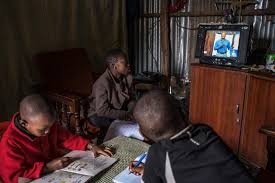Five-year-old Kenyan student Miguel Munene sits between his parents, holding their hands as he watches cartoon characters teaching him to pronounce “fish”.
The television has replaced Munene’s teachers and classmates after the government shut schools indefinitely in March to curb the spread of the novel coronavirus. They are closed until at least January.
Many children don’t have the option to learn online - the United Nations children’s agency UNICEF says at least half of sub-Saharan Africa’s schoolchildren do not have internet access.
So some, like Munene, watch a cartoon made by Tanzanian non-profit organisation Ubongo, which offers television and radio content for free to African broadcasters.
“Other programmes are just for fun, but Ubongo is helping children,” Miguel’s mother Celestine Wanjiru told Reuters.
“He can now differentiate a lot of shapes and colours, both in English and Swahili.”
In March, programmes by Ubongo - the Kiswahili word for brain - were broadcast to an area covering about 12 million households in nine countries, said Iman Lipumba, Ubongo’s head of communications. That rose to 17 million in 20 countries by August.
“The COVID-19 pandemic has really forced us to rapidly grow,” Lipumba said.
A group of artists, innovators and educators set up Ubongo TV in Tanzania in 2014. It has received around $4 million in grants since, and earned $700,000 from YouTube, product sales, character licensing, and co-production of programmes.
For Munene and other schoolchildren, programmes like Ubongo’s are their only option to learn for now.
Kenya’s education ministry says schools can only reopen when the number of COVID-19 cases drops substantially.
Kenya has had over 36,000 confirmed cases and more than 620 deaths, health ministry data showed.
“You have the kid with you all the time so when you have such programmes, they are a big help,” Patrick Nyaga, Miguel’s father, a security guard, told Reuters.
But television cannot completely replace teaching.
“The way the children learn through programmes is different (from) the way they interact with others and teachers,” Nyaga said. “We are hoping that they open soon.”
Latest Stories
-
A new dawn for Ghana: A bright future awaits in 2025
5 minutes -
Ghana is broke, gov’t is struggling to fund handing-over ceremony – Economist claims
7 minutes -
Premature commissioning of Sewua Hospital: A breach of public trust and contractual integrity
11 minutes -
We expect inflation to hit single digit by first quarter of 2026- BoG Governor
22 minutes -
GPL: Vision FC boss Nana Agyemang hopes win over Nsoatreman lifts players ‘spirits’
29 minutes -
Justice Srem Sai opposes swearing-in of Patrick Boamah, 2 others amid legal challenges
29 minutes -
Partey charges Arsenal to be ‘perfect’ in quest for league title
48 minutes -
Re-collated results: NPP manufactured their own pink sheets – Tanko-Computer alleges
56 minutes -
GPL: Prosper Ogum rues Kotoko’s missed chances in draw against Medeama
1 hour -
Augustine Boakye inspires Saint-Etienne to comeback win over Reims
1 hour -
Forson Amankwah scores brace in Norwich’s comebcak win over Coventry
2 hours -
NPP wants me to join their caucus, but my heart leans towards NDC – A-Plus
2 hours -
Andre Ayew scores season opener in Le Havre defeat to Marseille
2 hours -
GPL 2024/25: Nations FC breeze past Basake Holy Stars
2 hours -
World Bank Regional Vice President for Western and Central Africa to visit Ghana
3 hours

